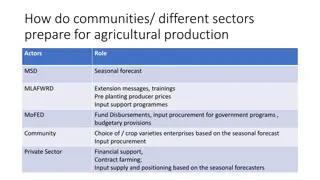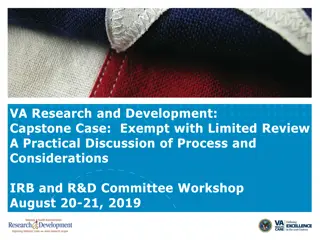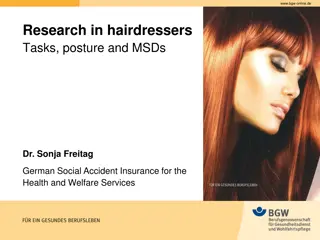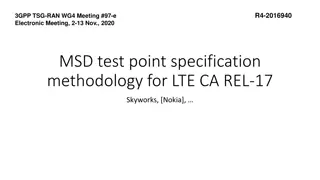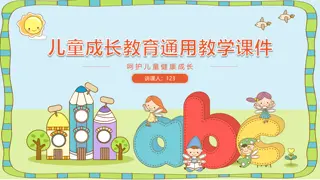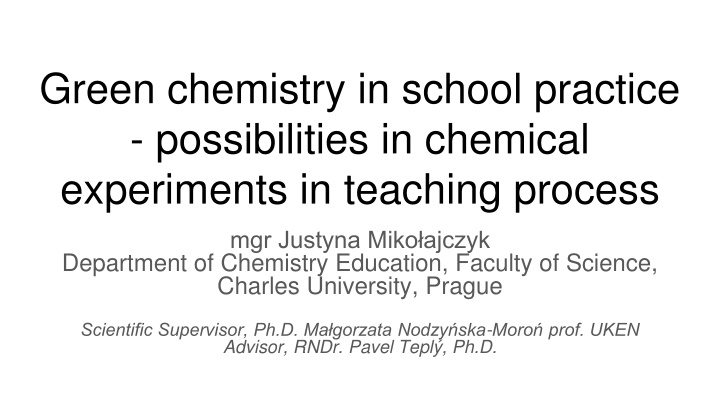
Exploring Green Chemistry in School Experiments and Teaching Practices
This study delves into the integration of green chemistry principles in school education, focusing on motivating students through environmental contexts, hands-on learning, and inclusivity. The research aims to assess how teachers apply green chemistry in their teaching and its impact on students' ecological awareness and knowledge acquisition compared to traditional experiments.
Download Presentation

Please find below an Image/Link to download the presentation.
The content on the website is provided AS IS for your information and personal use only. It may not be sold, licensed, or shared on other websites without obtaining consent from the author. If you encounter any issues during the download, it is possible that the publisher has removed the file from their server.
You are allowed to download the files provided on this website for personal or commercial use, subject to the condition that they are used lawfully. All files are the property of their respective owners.
The content on the website is provided AS IS for your information and personal use only. It may not be sold, licensed, or shared on other websites without obtaining consent from the author.
E N D
Presentation Transcript
Green chemistry in school practice - possibilities in chemical experiments in teaching process mgr Justyna Miko ajczyk Department of Chemistry Education, Faculty of Science, Charles University, Prague Scientific Supervisor, Ph.D. Ma gorzata Nodzy ska-Moro prof. UKEN Advisor, RNDr. Pavel Tepl , Ph.D.
Preliminary literature analysis 1. environmental problems can provide a motivating context for student learning of content 2. more hands-on 3. creating more opportunities within special education = inclusivity 4. It's empowering for kids, and it's a different way of thinking about things. And we have to change the way we think about things. hard to change the way of teaching Nahlik, P., Kempf, L., Giese, J., Daubenmire, P. (2022). Developing green chemistry educational principles by exploring the pedagogical content knowledge of secondary and pre- secondary school teachers. Chemistry Education Research and Practice, 24, 283-298. https://doi.org/10.1039/D2RP00229A
Preliminary literature analysis digitalization of chemistry classes as the future of sustainability in the chemical industry chemistry has the potential to drive global sustainability efforts modernizing chemical education by integrating sustainability across curricula is a key responsibility to academic institutions to instill sustainability thinking and provide technical proficiency to future professionals Fantke, P. et al. (2021). Transition to sustainable chemistry through digitalization. Chem, 7 (11), 2866-2882. https://doi.org/10.1016/j.chempr.2021.09.012 Mitchell, S. et al. (2024). The Future of Chemical Sciences is Sustainable. Angewandte Chemie- International Edition. https://doi.org/10.1002/anie.202318676
Preliminary literature analysis no comparison between the use of green chemistry and traditional experiments and the impact on the ecological awareness on teachers and students lack of information on the potential impact of chemical pollution on the city's environment lack of developed materials publicly available for teachers to use
Research questions of the doctoral dissertation project 1. To what extent chemistry teachers in primary schools know the green chemistry principles? 2. To what extent chemistry teachers in primary schools use green chemistry principles in their teaching practice? 3. What impact does the use of green chemistry principles in school practice have on students' ecological awareness? 4. What impact does the use of green chemistry principles in school practice have on the knowledge students gain during lessons compared to a traditional chemistry experiments?
Main goals 1. presenting teachers with the possibilities of green chemistry in school practice - questionnaires 2. preparing and publishing available study of chemical experiments from the Polish core curriculum for primary schools - online 3. increasing environmental awareness of students and teachers using sustainability - green chemistry
Phase I - sewage treatment plant 1. Obtaining information of the possibilities of neutralizing toxic waste run by the municipal sewage treatment plant in Krakow - what compounds and in what quantities can be neutralized in the treatment plant. Research of the information online
Phase II - surveys for chemistry teachers The teacher's perception questionnaire, semi-structured interviews of teachers 1. teachers' experiences with the use of chemical compounds harmful to the environment 2. methods of waste disposal after classes 3. awareness of the toxicity of chemical waste 4. knowledge of the principles of safe waste disposal 5. school laboratory equipment 6. knowledge of the principles of green chemistry 7. using green chemistry in school practice Jusniar, J., Syamsidah, S., Auliah, A. (2023). Teacher s and Student s Perceptions of Green Chemistry and its Principles in Chemistry Learning in High Schools. Jurnal Penelitian Pendidikan IPA. 9. 7924-7934. 10.29303/jppipa.v9i10.4756.
Phase III - developing green chemistry experiments 1. to develop experiments using the principles of green chemistry, which would be an alternative to experiments included in the Polish core curriculum in chemistry experiments from the polish core curriculum in chemistry - list of experiments The following set of experiments is proposed to be performed by students independently or as a teacher's demonstration: examination of physical properties (state of matter, colour, solubility in water and petrol, interaction with a magnet, brittleness, plasticity, density) and chemical properties (reaction of an aqueous solution, pH, flammability) of selected products (table salt, sugar, flour, vinegar, edible oil, water, coal, aluminium, copper, iron);
Phase IV - research in schools Control group Experimental group traditional demonstration green chemistry demonstration traditional video of experiment green chemistry video of experiment traditional experiment - students working in groups green chemistry experiment - students working in groups obocki, M. (2000). Metody i techniki bada pedagogicznych. IMPULS
Phase IV - research in schools 1. Conducting standard and modified experiments in selected schools or one school. 2. Surveying teachers to compare the advantages and disadvantages of both methods such as: a. safety for participants and the environment, b. the possibilities of Polish schools when purchasing reagents and laboratory glassware, Semi-structured interviews with teachers (before and after classes). Likert scale questionnaire for students before and after classes with green chemistry and traditional experiments - compare the increase in knowledge, motivation to study chemistry, environmental awareness, interest in topic. obocki, M. (2000). Metody i techniki bada pedagogicznych. IMPULS
Methods, tools, products 1. interviews with teachers about their experiences with green chemistry, their approach and willingness to use the principles of green chemistry in lessons 1. a book / YouTube viedos with alternative chemical experiments from the Polish core curriculum using the principles of green chemistry
Methods, tools, products 1. questionnaire for students and teachers taking parts in alternative and standard classes (before and after conducting them) 1. observation of students during alternative and standard classes 1. interview with teachers before and after alternative and standard classes 1. analysis of documents - school textbooks and core curriculum in terms of sustainability and green chemistry
Bibliography Fantke, P. et al. (2021). Transition to sustainable chemistry through digitalization. Chem, 7 (11), 2866-2882. https://doi.org/10.1016/j.chempr.2021.09.012 Jusniar, J., Syamsidah, S., Auliah, A. (2023). Teacher s and Student s Perceptions of Green Chemistry and its Principles in Chemistry Learning in High Schools. Jurnal Penelitian Pendidikan IPA. 9. 7924-7934. 10.29303/jppipa.v9i10.4756. obocki, M. (2000). Metody i techniki bada pedagogicznych. IMPULS Mitchell, S. et al. (2024). The Future of Chemical Sciences is Sustainable. Angewandte Chemie-International Edition. https://doi.org/10.1002/anie.202318676 Nahlik, P., Kempf, L., Giese, J., Daubenmire, P. (2022). Developing green chemistry educational principles by exploring the pedagogical content knowledge of secondary and pre-secondary school teachers. Chemistry Education Research and Practice, 24, 283-298. https://doi.org/10.1039/D2RP00229A Pali-Sch ll, I., Hermuth Kleinschmidt, K., Dramburg, S., Agache, I.,Mayerhofer, H., Jensen-Jarolim, E., Goshua, A., Nadeau, Ki. (2023). An EAACI review: Go green in health care and research. Practical suggestions for sustainability in clinical practice, laboratories, and scientific meetings. Allergy. 78. 10.1111/all.15836.
Thank you very much for yout attention









